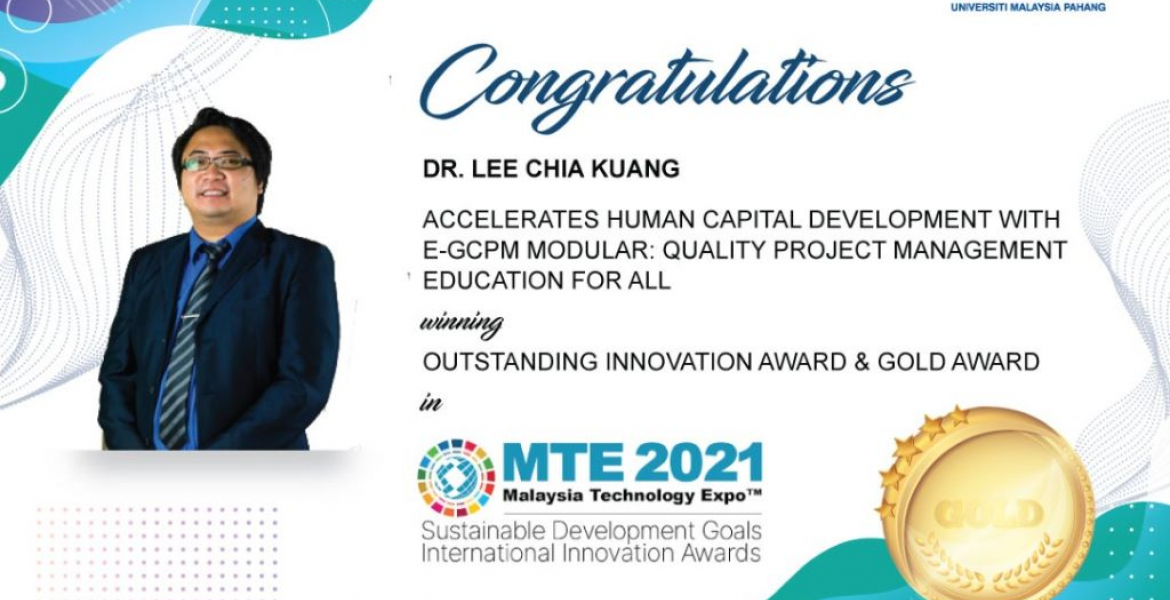E-GCPM Modular helps students deepen Project Management Book of Knowledge (PMBOK®)
Project management is a fast-growing profession.
Continuous certification in project management is in line with the United Nations’ Social Development Goals to ensure equal access to affordable and high-quality technical, vocational and higher education for university students in developed and developing countries.
However, the COVID-19 pandemic has made it difficult for students who want to improve their skills to obtain education, certification and training in project management.
Therefore, to overcome this problem, a senior lecturer and researcher from the Faculty of Industrial Management (FPI), Universiti Malaysia Pahang (UMP), Dr. Lee Chia Kuang, 36, has created Electronic Global Certified Project Management Modular (E-GCPM Modular).
According to him, E-GCPM Modular is a modular concept of project management teaching that combines theory, live simulation and modular training provided through an online platform.
“It aims to help students deepen the Project Management Book of Knowledge (PMBOK®) and pass in accredited certification exams such as Certified Associate in Project Management (CAPM®).
“E-GCPM has also been successfully used, tested and validated for its effectiveness in teaching 50 students towards CAPM® certification.
“All of them managed to become certified members of the Project Management Institute (PMI) and 32 of them passed the CAPM® examination since mid-June 2021,” said the native of Alor Setar, Kedah.
The research titled Accelerates Human Capital Development with E-GCPM Modular: Quality Project Management Education for All has started in mid-2019.
The research developed on his own initiative was applied in the PMBOK 6th Edition Training 1.0: Towards CAPM Certification Program on 1 October 2020 under the sponsorship of the Ministry of Higher Education (MoHE) Graduate Employability Grant worth RM84,600.00.
According to Dr. Lee Chia Kuang, the idea of this study started when online teaching and learning (T&L) became essential in early 2020.
“Therefore, innovation efforts are made on the modules and teaching methods so that students can understand and master project management effectively online.
“This study was conducted privately and I would like to express my high appreciation to UMP and MoHE for the opportunity given to test its effectiveness through the KPT Graduate Employability Grant.
“In short, E-GCPM Modular works in training design through three main phases, Phase 1 to 3.
“In Phase 1, students will receive guidance and theoretical instructions on all 13 Project Management subjects through online training.
“All these topics have been adapted from PMBOK® and simplified to make it more accessible and understood by students,” he said.
He added that for Phase 2, students will be guided through simulation, interpretation and quantitative project management.
“Students will learn quantitative decision-making techniques.
“Meanwhile, for Phase 3, students will be guided through 150 drill questions with guided example answers.
“Three days before the actual CAPM® exam, another 20 questions with higher difficulty will be simulated to students.
“The levels of difficulty of the designed questions are divided into three, namely easy, medium and difficult,” he said.
The research outputs aim to enable instructors to teach better, standardise project management teaching approaches more effectively and help students towards accredited certification in project management.
This initiative can help developing countries such as Malaysia in their efforts to develop their human capital faster.
He hoped that the functions and use of E-CGPM Modular could be extended to project-based industries to benefit practitioners and project management professionals.
He further explained that the main purpose of this innovation is to benefit university students while the cost or mechanism of this innovation is still in adjustment and has not yet been officially commercialised.
For the record, E-GCPM Modular won the Gold Award and Outstanding Innovation Award at the MTE Sustainable Development Goals (SDG) International Innovations Awards held on 25 to 29 October 2021 recently.
This innovation is also a continuation of his other innovations such as DEMATEL Digraph and DEMAEX-SIM.
“It can be jointly used to increase the effectiveness and mastery of students in project management,” he said, who received his PhD in Civil Engineering at the University of Auckland, New Zealand.
By: Safriza Baharuddin and Nur Hartini Mohd Hatta, UMP Press
Translation by: Dr. Rozaimi Abu Samah, Engineering College/Faculty of Chemical and Process Engineering Technology
- 150 views










